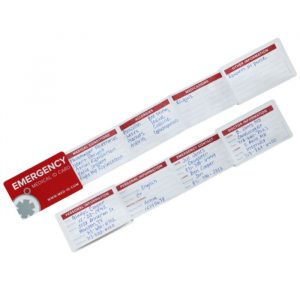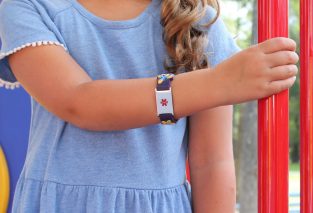First ask this: what is the most important medical information that should be known about me in an emergency?
If you or your loved one live with complicated medical issues, you may have a chat with your doctor, nurse, pharmacist or other medical professional. There is simply no way to give “if then” guidance to universally apply for your engraving layout. It almost always comes down to the individual.
With the above in mind, here are a few takeaways:
If you have Diabetes, make sure it is known by engraving that on the ID. Indicate whether it is type 1 or type 2 and the medicine you take for control.
Many heart patients take blood thinners every day. It is crucial to make that known, ideally specific to the medicine you are on. It helps to know if you are taking Warfarin or Plavix.
For other heart related diagnoses is important to show them on your ID. Examples are coronary artery disease, arrhythmias such as atrial fibrillation), congestive heart failure, hypertension, pacemaker, heart transplant, etc.
Serious allergies are increasingly common for reasons not entirely understood. Anaphylaxis is a life threatening allergic reaction. For those allergies considered serious, engrave them onto the ID. This will help emergency responders administer epinephrine or other agent to reverse the reaction.
If you or your child carries an Epipen, make it known and how to find it. “Epipen in backpack” for example.
Individuals are unique and medical issues can sometimes be complicated.
For most, include only the basics on your ID…name, condition, emergency contact. Very often it’s that simple.
For others with multiple conditions, seeking advice from a medical provider is a good idea.
 When the list of diagnoses and conditions is long, remember that a medical ID wallet card can be an effective companion to your medical ID. “See Wallet Card” is something we see engraved often onto an ID where there is simply too much information to fit or the info is subject to change.
When the list of diagnoses and conditions is long, remember that a medical ID wallet card can be an effective companion to your medical ID. “See Wallet Card” is something we see engraved often onto an ID where there is simply too much information to fit or the info is subject to change.
There are also different options of Medical IDs that can provide larger engraving spaces to fit more information.
Do I list all of my medicines and dosages?
As space permits, it’s a good idea to include medicines you are taking, at least the ones you take continuously.
For short term prescriptions for acute illnesses (antibiotics, etc.) it does not make sense to include.
Since dosages and strengths are subject to change, it is often best to keep that info on your wallet card and not have it permanently engraved.
If your list of daily medicines is longer than will fit onto a medical ID consider placing them all on your medical ID wallet card and engrave “See wallet card for meds”.
Some exceptions – always note a blood thinner on your ID. Same for diabetes meds and Epipen references. If not sure, ask your pharmacist or doctor which are the most important medicines to show on your ID.
What about emergency contact numbers?
Imagine yourself in an emergency where you may be unconscious, incoherent or unable to speak clearly for any reason. Imagine the same for a loved one – your child, your parent? Would you like to be notified?
Many ID wearers choose to include emergency contact names and phone numbers. In some cases and where space permits, secondary family members can be included or even a physician.






